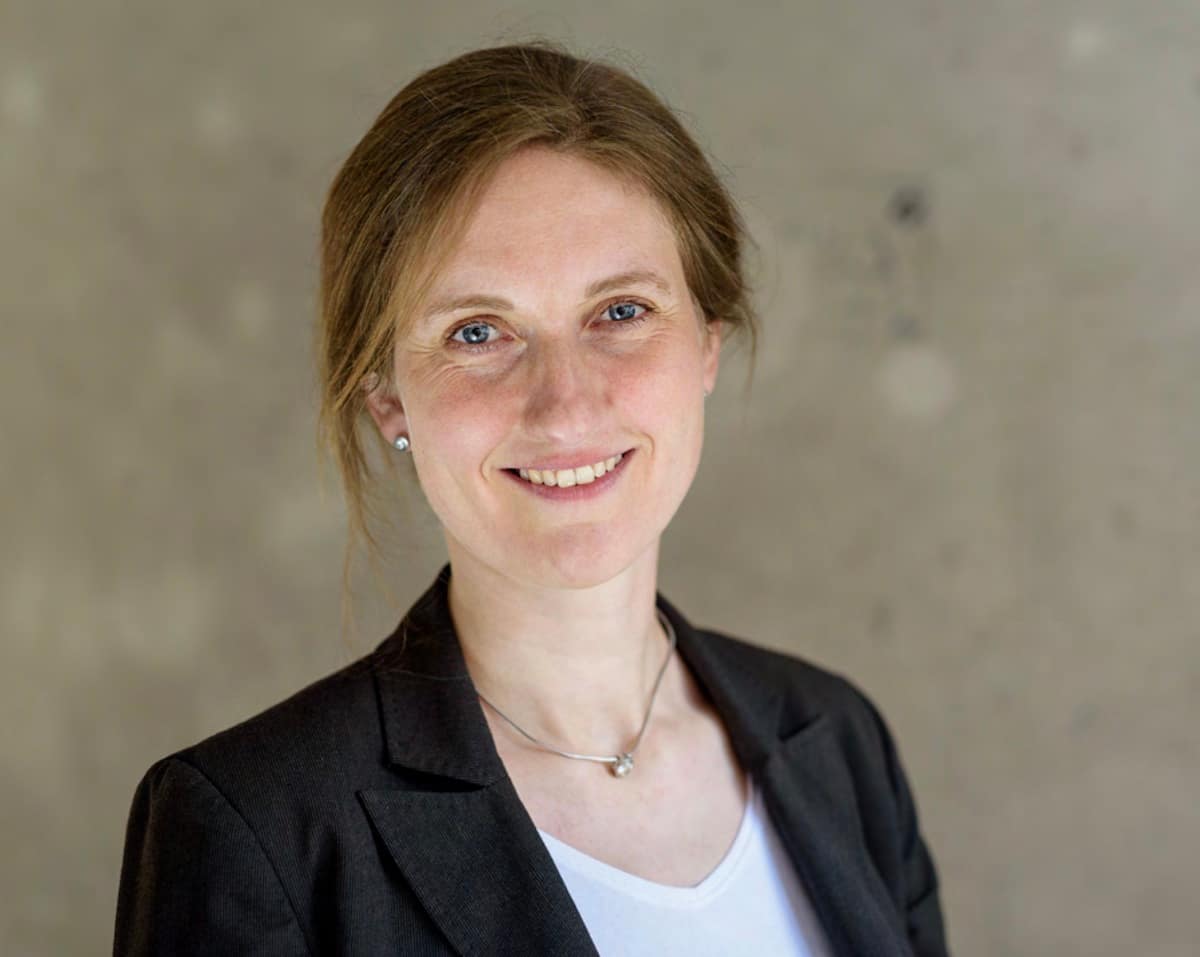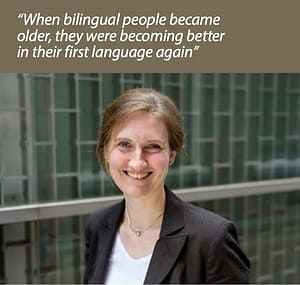
Language learning and bilingualism: A riveting interview with Prof.Dr. Merel Keijzer
Every quarter, we share articles published in the BCN Newsletter and we are happy today to share an interview with Merel Keijzer on language learning. The interview was conducted and written by Kavya Prasad, a PhD candidate in molecular imaging and neuroscience at the UMCG.
Merel Keijzer is a professor of English linguistics and English as a second language (ESL) and a recipient of the Rosalind Franklin fellowship. She is currently heading a project that is based on second language learning titled : “Language Learning Never Gets Old: Foreign language learning as a tool to promote healthy aging”. The aim of her research group is to provide a new impetus to the field of bilingualism and its applicability in healthy ageing.
What were the successful factors in your application that contributed to the achievement of Rosalind Franklin Fellowship?
When I was a student, I really wanted to do a PhD and after completing my PhD, I thought academia was not apt for me. It was a lot of stress and late hours. So I went into teaching outside of academia and tried applying for different teaching positions. However, I also started missing academia. I was working in Utrecht as an assistant professor for 5 years and then I saw the opening for the Rosalind Franklin fellowships. I thought this was great, since relatively few women are in full-time professor positions. I am not sure what the successful factors were, however, I think the drive and determination were important factors to apply. My CV was also not a standard type of CV since I had a gap in between. Thus, having been away from academia made it more determining to apply for the fellowship. We have to be in the right place at the right time and know the right people. At that point of time they were looking for someone with a background of second language acquisition (such as I) but from a psycholinguistic perspective. It was a good timing. We must make our chances as good as they can be and that doesn’t mean a straight CV. There can be gaps as long as you explain the choices that you made.
How different was your dissertation compared to your current work in terms of the subject covered? What made you interested in this current field (second language development and usage of the same for senior citizens with cognitive impairment)?
The subject covered may seem different, but it is not. There is more of an overlap. I looked at language attrition: How a first language fades away when you become immersed in another language environment, i.e., when you learn a second language. There was already a second language aspect. Because there wouldn’t be first language attrition if there wasn’t second language acquisition. I noticed in my PhD that when people became older, they were becoming better in their first language again. This was interesting since the opposite would generally be expected. Thus, I started looking at how this would work with brain aging, inhibition, and how its related to language. This led to my interest in brain and language and how language learning could have a positive effect on cognitive flexibility. When I looked at Dutch people who had moved to Canada years ago, when telephones did not really exist, I learned that they called themselves “immigrants”. People these days tend to call themselves “expats”. There are lots of ways to learn a new language these days. However what is not different from the past is the interaction between the first and second language competition. That is really what drives a bilingualism researcher. This is where my passion lies in.
What have you learnt through this process?

What are the areas of research that impel you the most today? At the start of your career, were these the areas that captured/ intrigued you?
In a way yes, in a broader since. It has always been language and the fascination behind speaking multiple languages. That has always remained the same. For example, if you are in the bus and suddenly a person switches from one language to another, I always wondered why they would do that. Was there an emotional reason behind it? Essentially that interests me until this very day. Bilingualism, and partly what causes it, and what it leads to. Overall fascination has not changed since the beginning.
Which methodology or technique that you have developed would have an impact on the field of linguistics?
I had developed a questionnaire with one of my first PhD students from Groningen. Since no two bilinguists are the same and there are always different language experiences, there was no questionnaire for older bilinguists that tapped into their life experiences. That is something that was developed as a part of her PhD and is continued to be used. It is hopefully made clear that it is not a good thing to lock all the bilinguists together, especially seniors. Since, apart from emotions as a factor, there is also well being. Different languages have different emotional attachment to them. This may be more important in senior stages. We must also take into account emotions that underlie bilingualism that can have cognitive effects. Hopefully we have bridged the gap between cognition and emotion. And how they come together in bilingual research. Were there significant differences? Yeah. People have reported an effect of bilingualism on cognition. They outperform people who are monolinguals. The findings were mixed, which led to debates. We found that bilingualism is a huge life experience and has an impact on cognition, but in conjunction with other factors. For instance, in a cluster analysis, we tried to tie together how open you are to new experiences. Bilingualism showed to be a significant predictor of cognitive performance but not by itself. How intricately it links along with other factors. This may shed a light on other studies.
In our current project we compare learning a new language to learning how to play guitar. We think that there may be an effect of learning a language over learning to play guitar, since there is competition between two languages. And if you learn a complex new skill, it can lead to structural and functional changes. We want to see if there is something unique about language compared to another skill. Another group have shown that as proficiency picks up, different neural pathways are activated. But if you stop using a language, they can be deactivated. It is interesting since they compare learning to juggle to a different kind of skill and what it leads to. It may revert back to baseline when the skill is not being practiced anymore.
Are there any languages that you have tried to learn? How was your experience in this learning process?
It is interesting because the theory behind second language development is that it never really works for yourself. I have learnt few languages. Dutch is my first language, I picked up English when I was 10 at school. In the Netherlands, there has been a lot of exposure to English via music, television and I picked it up in
a multimodal way of learning. I think I am better in English compared to the other foreign languages that I have learned. But I don’t really use German or French. I would like to learn a language purely for experiment, where there is no exposure at all in the Netherlands; a language notoriously different such as Hungarian. Just to see how that would work. Certain linguist colleagues have tried it and say that it doesn’t work. So I would be interested to do the same and see which language teaching method would be better suited in the language acquisition process. At school, we learn a language but not in much detail and I think the social side of language learning must not be forgotten. To make it meaningful and communicative. It would be nice to make language learning more communicative in schools. This would also stimulate social interactions.
■ PHOTOS BY RONALD ZIJLSTRA




